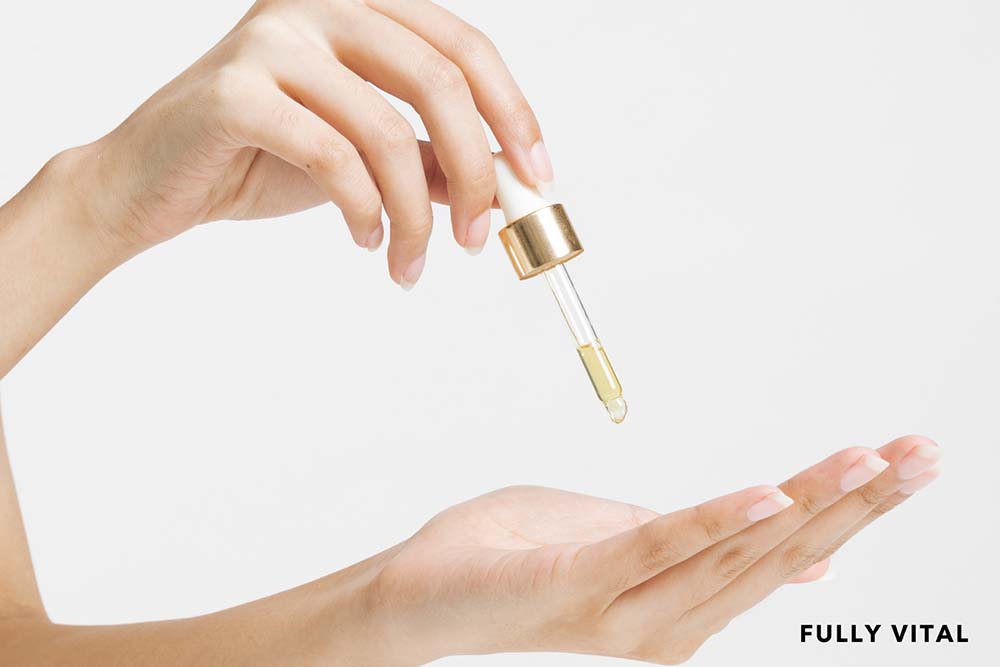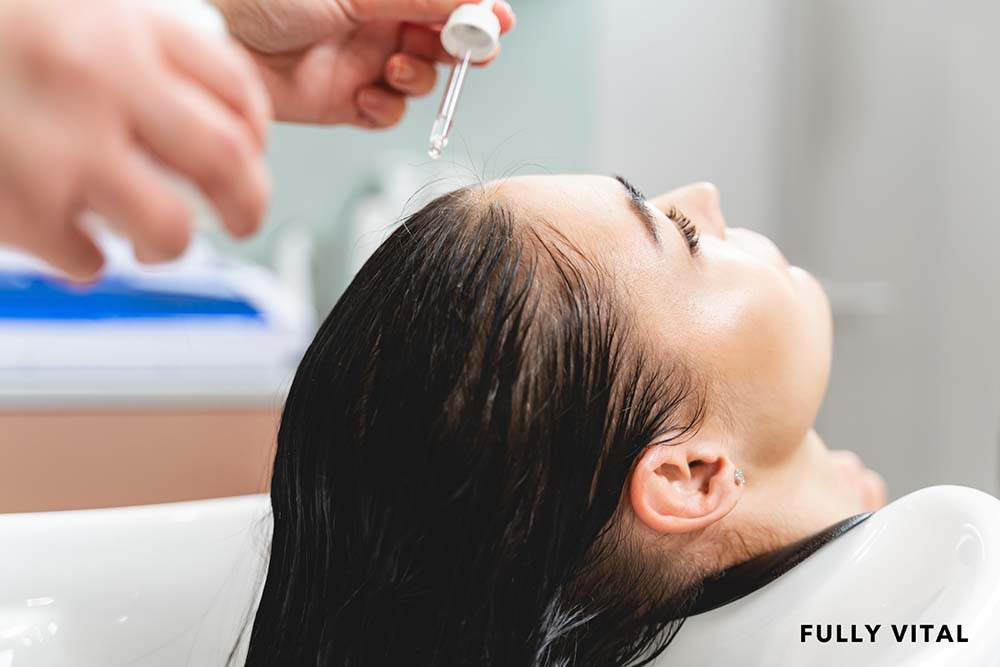
Parabens: Understanding the Basics and Exploring Alternatives
As women with different hair types seeking to stimulate hair growth, it's essential to know about the various ingredients used in hair products.
One such ingredient that often pops up in discussions is parabens.
In this article, we'll delve into what parabens are, why they are important, how they work, their benefits, potential downsides, and explore alternative options.

I LOVE MY HAIR NOW
FullyVital hair serum and hair vitamins made tremendous improvements in my hair. I truly love my hair now.
Dorit S.,
What Are Parabens?
Parabens are a group of chemicals commonly used as preservatives in various personal care and cosmetic products.
They have been widely used for several decades due to their effective antimicrobial properties, which help prevent the growth of bacteria, mold, and yeast in these products.

Why Are Parabens Important?
Parabens play a crucial role in maintaining the shelf life and safety of many hair growth products.
By inhibiting the growth of harmful microorganisms, they help prevent spoilage and protect consumers from potential infections or skin irritations.(1)
How Do Parabens Work?
Parabens work by disrupting the enzymes necessary for the survival and reproduction of microorganisms.
They penetrate the cell walls of bacteria and interfere with their metabolic processes, effectively inhibiting their growth and multiplication.
What Are The Benefits Of Parabens?
Effective Preservatives:
Parabens have been proven to be highly effective at preventing microbial contamination in hair growth products, ensuring their safety and quality over an extended period.
Extended Shelf Life:
By inhibiting microbial growth, parabens help extend the shelf life of hair growth products, reducing the need for frequent replacements.
Widely Tested and Regulated:
Parabens have undergone extensive safety assessments by regulatory bodies, such as the U.S. Food and Drug Administration (FDA) and the European Commission's Scientific Committee on Consumer Safety (SCCS).
They are considered safe for use in cosmetics at the permitted concentrations.
Are There Any Downsides To Parabens?
While parabens have been widely used in the beauty industry for many years, concerns have been raised regarding their potential long-term effects on human health.
Some studies suggest a possible association between parabens and hormonal disruption, although the evidence is not conclusive.
Additionally, individuals with sensitive skin may experience skin irritations or allergic reactions when using products containing parabens.
It is important to consider personal sensitivities and consult a dermatologist if any adverse reactions occur.
What Are The Alternatives To Parabens?
In response to growing consumer concerns, hair growth product companies have been exploring alternative preservatives.
Here are some common alternatives to parabens:
Phenoxyethanol
This preservative is often used as a substitute for parabens due to its broad antimicrobial activity and low sensitization potential.
Potassium Sorbate
It is a naturally derived preservative that helps prevent microbial growth in hair growth products.
Glyceryl Caprylate
This multifunctional ingredient acts as both a preservative and a skin conditioning agent, offering antimicrobial properties without the potential drawbacks associated with parabens.
Essential Oils
Some essential oils, such as tea tree oil and lavender oil, possess antimicrobial properties and can be used as natural preservatives in hair growth products.
Is Parabens A Natural Ingredient?
No, Parabens Are Not Natural Ingredients.
They Are Synthetic Chemicals That Are Commonly Produced Through Chemical Processes.
Parabens Are Derived From Para-Hydroxybenzoic Acid, Which Is Chemically Modified To Create Various Forms Of Parabens Used In Cosmetic And Personal Care Products.
Which Parabens Are Safe?
The Safety Of Parabens Depends On Their Concentration And Intended Use In Cosmetic Products.
Generally, Parabens At Permitted Concentrations Are Considered Safe For Use By Regulatory Bodies Such As The Fda And Sccs.
The Most Commonly Used Parabens In Cosmetics Include:
- Methylparaben
- Ethylparaben
- Propylparaben
- Butylparaben
It's Important To Note That Individual Sensitivities And Allergies May Vary, So It's Advisable To Check Product Labels And Consult With A Healthcare Professional If You Have Any Concerns.
What Are The Side Effects Of Paraben?
While Parabens Are Considered Safe For Use In Cosmetics, There Have Been Concerns About Their Potential Side Effects.
Some Studies Suggest A Possible Link Between Parabens And Hormonal Disruption, Although The Evidence Is Inconclusive.
Additionally, Individuals With Sensitive Skin May Experience Skin Irritations Or Allergic Reactions When Using Products Containing Parabens.
It's Important To Monitor Your Skin's Response And Discontinue Use If Any Adverse Reactions Occur.
Is Paraben Bad For Your Skin?
The Effect Of Parabens On The Skin Varies From Person To Person.
Some Individuals May Experience Skin Irritations Or Allergic Reactions, Especially If They Have Sensitive Skin.
However, Many People Can Use Products Containing Parabens Without Any Issues.
It's Important To Consider Personal Sensitivities And Perform A Patch Test Before Using A New Product.
If You Have Concerns Or A History Of Skin Sensitivities, Consulting With A Dermatologist Is Advisable.
What Is Another Name For Parabens?
Parabens May Appear Under Different Names On Product Labels.
These Alternative Names Are Often Used To Indicate Specific Types Or Forms Of Parabens. Some Common Alternative Names For Parabens Include:
-
Methylparaben: Methyl P-Hydroxybenzoate
-
Ethylparaben: Ethyl P-Hydroxybenzoate
-
Propylparaben: Propyl P-Hydroxybenzoate
-
Butylparaben: Butyl p-hydroxybenzoate
The History of Parabens in Hair Growth Products
Parabens have a long history in the world of hair growth products.
Here's a brief overview:
Discovery and Early Use:
Parabens were first synthesized in the late 19th century and quickly gained popularity as effective preservatives.
Their antimicrobial properties made them valuable for preventing spoilage in hair growth formulations.
Established Safety
Over the years, parabens underwent extensive safety evaluations by regulatory bodies.
They were found to be safe for use in cosmetics within permitted concentrations, including hair growth products.
Widespread Adoption
The efficacy and affordability of parabens led to their widespread use in the hair growth product industry.
They became a key ingredient in many shampoos, conditioners, serums, and treatments, helping to preserve the quality and integrity of these products.
The Current Environment of Parabens in Hair Growth Products
In recent years, the perception and use of parabens have shifted in response to consumer concerns and evolving industry trends.
Here's an overview of the current landscape:
Growing Awareness
Consumers are becoming more conscious of the ingredients used in the products they use, including hair growth products.
As a result, there has been an increased demand for paraben-free alternatives.
Demand for Natural and Safe Options
Many hair growth product companies have recognized this shift in consumer preferences and have started offering paraben-free options.
These products aim to provide effective hair growth solutions while addressing consumer concerns about potential side effects.
Balancing Safety and Performance
Hair growth product manufacturers are working towards finding suitable alternatives to parabens that maintain product safety and efficacy.
This includes exploring natural preservatives, innovative formulation techniques, and advancements in product packaging.
The Future of Parabens in Hair Growth Products
The future of parabens in the hair growth product industry is still evolving.
Here are some key considerations and trends:
Advancements in Preservation
Ongoing research and development efforts are focused on finding effective preservation methods that meet consumer demands for safety and natural ingredients.
This includes exploring new preservatives, optimizing formulation techniques, and employing advanced packaging solutions.(2)
Personalized Solutions
The future of hair growth products may involve a greater emphasis on personalized approaches.
Companies may develop customized formulations that cater to specific hair types, scalp conditions, and individual needs, incorporating preservative strategies that align with consumers' preferences.
Continued Regulatory Oversight
Regulatory bodies will continue to monitor and assess the safety of parabens and other preservatives used in cosmetic products.
As scientific research progresses, regulations may evolve to ensure the continued safety and effectiveness of hair growth products.
Unlock the Potential of Your Hair with Fully Vital!Are you tired of battling the signs of aging in your hair? Discover the power of science-backed hair growth products from Fully Vital and embrace a healthier relationship with your locks.
|
Finals Thoughts On Parabens
Parabens have played a significant role in the hair growth product industry as effective preservatives.
While they have been widely used for their antimicrobial properties, there have been concerns regarding their potential long-term effects and skin sensitivities.
As a result, consumers are seeking paraben-free alternatives that prioritize safety and natural ingredients.
At Fully Vital, we understand the importance of providing hair growth products that align with your preferences and concerns.
We offer a variety of solutions designed to combat the aging of your hair and promote a healthier relationship with your locks.
Our products are carefully formulated with your well-being in mind, utilizing innovative ingredients and preservation techniques.
As you explore the world of hair growth products, we encourage you to consider your individual needs, consult with healthcare professionals if needed, and make informed choices that support your hair health journey.
Remember, your hair deserves the best care possible.
Frequently Asked Questions about Parabens
Are natural preservatives as effective as parabens?
Natural preservatives, such as essential oils and plant extracts, can be effective at inhibiting microbial growth.
However, they may have different efficacy levels and may require additional formulation considerations to maintain product stability.
Can I find paraben-free hair growth products?
Yes, many hair growth product companies now offer paraben-free alternatives.
Look for labels that explicitly state "paraben-free" to ensure you're selecting products without these preservatives.
Is parabens a wax?
No, parabens are not waxes.
Parabens are a group of chemicals used as preservatives in cosmetic and personal care products.
They are not related to waxes, which are substances commonly used for their emollient or texturizing properties.
Are parabens harmful to my health?
The safety of parabens has been extensively studied, and they are considered safe for use in cosmetics at permitted concentrations.
However, some studies suggest a potential association between parabens and hormonal disruption.
Further research is needed to fully understand the long-term effects.
Do parabens only exist in hair growth products?
No, parabens can be found in a wide range of personal care and cosmetic products, including shampoos, conditioners, lotions, and makeup.
Always check the ingredient list if you wish to avoid products containing parabens.
Can I experience allergic reactions from using products with parabens?
Some individuals with sensitive skin may experience allergic reactions or skin irritations when using products containing parabens.
If you have a history of skin sensitivities, it's advisable to perform a patch test or consult a dermatologist before using such products.
Who created parabens?
Parabens were first synthesized in the late 19th century by a chemist named Johann Eduard Schnitzer.
Since then, their antimicrobial properties have led to their widespread use as preservatives in various industries, including cosmetics and pharmaceuticals.
Is paraben good or not?
The safety and suitability of parabens depend on their use and concentration in cosmetic products.
When used within permitted levels, parabens are considered safe for use by regulatory authorities such as the FDA and SCCS.
However, individual sensitivities and allergies can vary, and some people may experience skin irritations or allergic reactions.
It's important to consider personal factors and consult with a healthcare professional if you have any concerns.
Is paraben a drug?
No, parabens are not drugs.
They are primarily used as preservatives in cosmetic and personal care products to prevent microbial growth and maintain product integrity over time.
Parabens are not intended to treat or cure any specific medical condition.
Do all medicines have parabens?
Not all medicines contain parabens.
While parabens are commonly used as preservatives in cosmetics, their use in pharmaceuticals varies.
Some medicines may use alternative preservatives or employ different preservation techniques to ensure product stability and safety.
It's important to read product labels or consult with a healthcare professional to determine the specific preservatives used in a medication if you have concerns about paraben content.
Sources:
- Stoiber, T. (2019, April 9). What Are Parabens, and Why Don’t They Belong in Cosmetics? | Environmental Working Group. Www.ewg.org. https://www.ewg.org/what-are-parabens
- Anderson, E. (2019, May 6). Preservatives – Keeping our foods safe & fresh. Center for Research on Ingredient Safety. https://www.canr.msu.edu/news/preservatives-keeping-our-foods-safe-fresh







